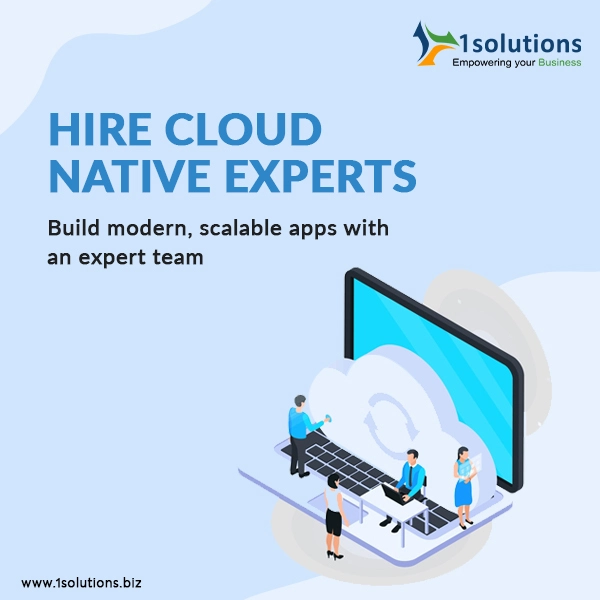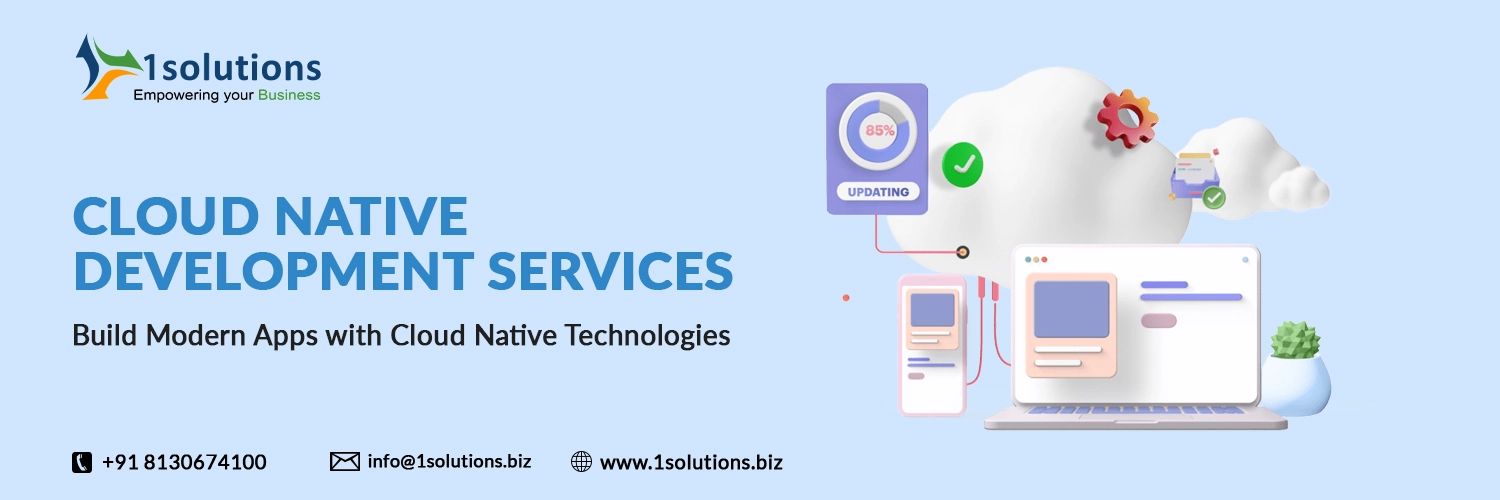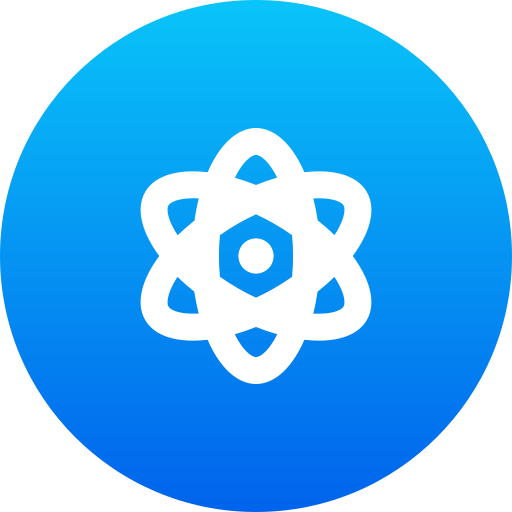
- Digital MarketingSEO ServicesSocial Media
- Design & Branding
- Web/Application DevelopmentEcommerceApp DevelopmentWebsite DevelopmentDedicated Hire
- About Us
Cloud Native Development Services
All-inclusive cloud native development, Kubernetes consulting, and modernization services for scalable, resilient enterprise applications.
At 1Solutions, we help organizations leverage the full power of modern cloud-native architecture to drive digital transformation. By building applications with containers, microservices, and automated DevOps pipelines, businesses gain unmatched agility and efficiency. Cloud-native services enable you to exploit the cloud’s scale, elasticity, and flexibility
Strategic Cloud Native Services for Scalable Innovation
- Kubernetes Deployment & Management
- Container Orchestration
- Microservices Design & Implementation
- CI/CD Automation
- Cloud-Native Application Development
- Cloud Infrastructure Modernization
At 1Solutions, we offer strategic cloud native development services that help enterprises build resilient, agile, and scalable digital systems. Our approach blends containers, microservices, CI/CD automation, and infrastructure as code to replace legacy architectures with cloud-native environments optimized for rapid innovation.
From initial planning to full-scale deployment, our experts deliver tailored services including Kubernetes consulting, container orchestration, microservices design, and cloud-native application development using frameworks like Spring Boot and Node.js. We automate delivery pipelines with tools like Jenkins and GitHub Actions to ensure faster release cycles and operational efficiency.
We also guide enterprises through cloud infrastructure modernization, using tools like Terraform and Ansible to re-platform legacy systems into dynamic, cloud-native architectures. Whether you’re running on AWS, Azure, or GCP, our solutions are designed for portability, cost efficiency, and long-term scalability. This empowers your business to innovate and respond faster in an ever-changing digital landscape.
Satisfaction Rate
Project Delivery
Operational Costs
experience
Our Cloud Native Services Offerings
01.
Kubernetes Consulting
& Management
- We manage production-grade Kubernetes clusters on AWS, Azure, or GCP. We handle setup, security, scaling, and upgrades.
02.
Container
Orchestration
- We build container solutions with Docker and OpenShift, implementing advanced deployment, networking, and service mesh strategies.
03.
Microservices
Architecture
- We modernize legacy apps into microservices, managing design, APIs, data, and communication for scalable, modular systems.
04.
CI/CD Pipeline
Automation
- We automate CI/CD pipelines using Jenkins, GitLab, or GitHub to streamline builds, tests, deployments, and rollbacks.
05.
Cloud-Native
Application Development
- We build cloud-native apps using 12-factor principles, modern frameworks, and integrated cloud services for scalability.
06.
Cloud Infrastructure
Modernization
- We modernize infrastructure using IaC tools like Terraform, enabling cloud migration, re-platforming, and hybrid-cloud support.
Why Hire 1Solutions for Cloud Native Development Services?
Choosing the right cloud-native partner shapes your digital transformation. 1Solutions blends technical expertise and strategy to deliver scalable, modern solutions trusted by businesses across diverse industries.
Expert Developers
Our team includes certified cloud engineers, DevOps specialists, and Kubernetes consultants with hands-on experience in designing and deploying cloud-native applications across AWS, Azure, and GCP.
Proven Track Record
From startups to enterprises, we’ve successfully delivered cloud modernization, microservices architecture, and CI/CD automation projects that improve agility and reduce operational costs.
User-Centric Approach
We design cloud-native systems with your end users in mind, prioritizing performance, availability, and seamless experiences across platforms and devices.
Cutting-Edge Technology
We stay ahead of the curve by leveraging the latest in containerization, orchestration, infrastructure automation, observability, and cloud-native security practices.
Transparent Communication
Clear documentation, regular updates, and collaborative workflows ensure you’re always informed and in control of your project’s progress.
Client Satisfaction Focus
Our success is measured by your satisfaction. We’re committed to delivering outcomes that align with your business goals and exceed expectations.
What Our Clients Say




- Disha Narang
(Imagine)


Their team is always available when needed, offering the right solutions at the right time. This commitment to service quality is why we have trusted them for several years and continue to recommend them to others with full confidence, knowing they will be in capable hands.
Wishing the entire 1Solutions team continued success!

I am happy with your service, it is exceptional, designing is just great. I am impressed. I advise to all friends to avail your services.
Thank you,
Acharya Praveen Chauhan











Why Cloud Native Is Important for Businesses?
Automated CI/CD pipelines and Infrastructure as Code eliminate manual bottlenecks, enabling feature releases and security patches in hours instead of weeks.
Kubernetes‑powered container orchestration scales services up or down with real‑time demand, ensuring peak performance while you pay only for resources consumed.
Microservices isolate failures and self‑healing capabilities automatically recover unhealthy pods. DevSecOps practices bake compliance and vulnerability scans into every build.
Build once, run anywhere—whether on AWS, Azure, GCP, or hybrid clouds, so you stay free to choose best of breed services without lock‑in.
Standardized container environments and declarative IaC reduce “it works on my machine” issues, letting teams focus on innovation rather than debugging.
Integrated logging, metrics, and tracing with tools like Prometheus and Grafana provide end‑to‑end visibility, letting you detect and resolve performance issues proactively.
Typical Agency

Generic Strategy

Limited Flexibility

Communication Barriers

Higher Cost Structure

Standard Reporting


Customized Strategic Approach

Cost-Effective Expertise

Comprehensive Skill Ecosystem

Advanced Technology Integration

Transparent, Results-Driven Partnership
In House Team

High Recruitment Costs

Limited Expertise Range

Technology Investment

Scalability Issues

Narrow Perspective

In today’s fast-moving digital world, having resilient and efficient software delivery isn’t just a nice-to-have; it’s essential. By leveraging Cloud Native Development Services, your organization can accelerate innovation cycles, streamline operations, and gain a competitive edge through automated, repeatable processes.
Cloud native development brings together people, processes, and technology to enable rapid, reliable releases at scale. It eliminates manual handoffs, reduces downtime, and fosters a culture of continuous collaboration, making it the ideal approach for businesses pursuing faster time‑to‑market and ongoing improvement.
At 1Solutions, we recognize the unique challenges of adopting cloud-native architectures. Our team of certified engineers has deep expertise across the entire container and microservices landscape, from CI/CD pipelines and Infrastructure as Code to Kubernetes orchestration and observability.
We leverage this knowledge to deliver tailored Cloud Native Development Services that prioritize automation, security, and scalability. By designing custom workflows, we ensure seamless integration with your existing stack, enforce best practices through code-defined infrastructure, and uphold rigorous testing and quality standards. Throughout every engagement, transparent communication and a client-centric mindset keep you informed and empowered.
Our cloud-native specialists bring years of hands‑on experience across finance, healthcare, e‑commerce, and IoT. We use industry‑leading tools like Docker, Kubernetes, Jenkins, Terraform, and Prometheus to build high‑performance, future‑ready environments that evolve with your business ambitions.
Contact 1Solutions today for a free consultation. We’ll work closely with you to understand your goals and craft a Cloud Native Development Services strategy aligned to your objectives; speeding up your delivery pipeline and ensuring a resilient, scalable future.
Trusted by 100+ Clients Globally | ROI Driven Work









Key Components of Cloud Native Development Services
Cloud Native Development Services refer to the design, development, deployment, and management of applications that are built to run in modern, dynamic cloud environments. These services utilize cutting-edge technologies such as containers, microservices, Kubernetes, and CI/CD automation to deliver applications that are scalable, resilient, and agile.
Unlike traditional software development, cloud native development embraces cloud-first principles, meaning applications are designed to take full advantage of cloud infrastructure from the ground up. Instead of relying on monolithic architecture, cloud native apps are broken into small, independent services that can be developed, deployed, and scaled individually.
Containers are a foundational element of cloud native development. They allow developers to package applications with all their dependencies into isolated, lightweight environments that can run reliably across any computing environment.
Unlike virtual machines, containers do not require a full operating system and can share the host OS kernel, making them far more efficient and faster to start.
Tools like Docker have revolutionized how applications are built, shipped, and deployed. By using Docker containers, development teams can ensure consistency across development, testing, and production environments.
This eliminates the classic “works on my machine” problem and accelerates delivery cycles. Containers are also highly portable and scalable, making them ideal for building microservices-based applications that need to run across cloud platforms like AWS, Azure, and Google Cloud.
Microservices architecture is a design approach where a single application is developed as a suite of small, independently deployable services. Each service is responsible for a specific function and can be written in different programming languages or frameworks as needed.
These services communicate with each other over lightweight APIs and can be developed, deployed, and scaled independently. This modular approach allows for faster development cycles, greater flexibility, and improved fault tolerance.
In the event that one service fails, it does not bring down the entire system. Microservices enable teams to iterate quickly, make changes without disrupting the entire application, and scale only the necessary components. In the context of cloud native development, microservices are crucial for achieving the speed, resilience, and scalability modern businesses demand.
Kubernetes is an open-source container orchestration platform that automates the deployment, scaling, and management of containerized applications. It serves as the operating system of the cloud native world, ensuring that containers are running as intended across clusters of machines.
Kubernetes handles container scheduling, load balancing, service discovery, rolling updates, and self-healing of applications. If a container fails, Kubernetes automatically restarts it, ensuring minimal downtime and maximum availability.
With built-in features like horizontal scaling and automated rollouts, it simplifies the complexity of managing containerized environments at scale. For organizations adopting cloud native strategies, Kubernetes provides the reliability, efficiency, and control needed to run production workloads across private, public, or hybrid cloud infrastructure.
Continuous Integration and Continuous Deployment (CI/CD) are essential practices in modern software development and are core to cloud native workflows.
Continuous Integration ensures that developers frequently merge code changes into a shared repository, triggering automated builds and tests that validate the changes in real-time.
Continuous Deployment takes this a step further by automatically deploying tested code to production environments with little or no human intervention. This streamlines the release process, reduces bugs, and allows teams to deliver new features and fixes faster and more reliably.
In a cloud native context, CI/CD pipelines are tightly integrated with container orchestration and infrastructure automation tools, ensuring that applications are tested, packaged, and deployed consistently.
By automating the entire software delivery lifecycle, businesses can respond to customer needs faster, reduce deployment risks, and improve operational efficiency.
Infrastructure as Code (IaC) is a modern approach to managing and provisioning infrastructure through machine-readable configuration files. Instead of manually setting up servers, networks, and other resources, IaC allows teams to define their entire infrastructure stack using code, which can be version-controlled, tested, and reused. Tools such as Terraform, Ansible, and AWS CloudFormation make it possible to deploy infrastructure in a consistent, repeatable manner across multiple environments.
This dramatically reduces human error, increases speed, and improves the traceability of changes. In a cloud native ecosystem, IaC supports the rapid provisioning of resources required for containers, microservices, and CI/CD pipelines. It also enables immutable infrastructure practices, where systems are never modified after deployment—instead, they are rebuilt from code.
This makes environments more predictable, secure, and scalable, aligning perfectly with the principles of cloud native development.
In cloud native environments, where applications are distributed across microservices, containers, and dynamic infrastructure, observability is critical. Observability refers to the ability to measure the internal states of a system based on the data it produces such as logs, metrics, and traces. Unlike traditional monitoring that focuses on predefined metrics, observability helps teams proactively identify, troubleshoot, and resolve issues in real time.
Cloud native applications must be instrumented with tools that provide comprehensive insights into performance, availability, and user experience. Solutions like Prometheus, Grafana, ELK Stack, and OpenTelemetry enable teams to collect and visualize system behavior across the entire stack from infrastructure and containers to application-level services.
With proper observability, teams can detect anomalies before they impact users, perform root cause analysis quickly, and optimize resource usage. Combined with alerting systems and incident response workflows, observability supports higher uptime, faster debugging, and continuous improvement.
In a cloud native development model where systems are constantly evolving and scaling, observability is not just a nice-to-have. It is a foundational component for maintaining operational excellence and ensuring resilient and reliable software delivery.
Frequently
Asked Questions
Frequently asked question (FAQs) about our Cloud Native Services.
Cloud Native Development Services refer to the design, development, and deployment of applications built specifically to run in dynamic, cloud-based environments. These services leverage containers, microservices, Kubernetes, CI/CD, and infrastructure as code to create scalable, resilient, and flexible software systems.
Cloud native architecture enables faster time-to-market, improved scalability, and better system resilience. It allows businesses to innovate rapidly, scale on-demand, and reduce downtime by leveraging technologies like microservices and Kubernetes.
Kubernetes is a container orchestration platform that automates the deployment, scaling, and management of containerized applications. It ensures high availability, load balancing, self-healing, and efficient resource usage—making it essential to cloud native systems.
CI/CD (Continuous Integration and Continuous Deployment) automates the process of building, testing, and deploying code. In cloud native development, CI/CD ensures faster, more reliable releases and supports agile delivery by integrating seamlessly with containers and microservices.
Yes, cloud native development benefits a wide range of industries including finance, healthcare, retail, logistics, and SaaS. Its flexibility and scalability make it ideal for businesses looking to modernize legacy systems and embrace digital transformation.
Common technologies include Docker for containerization, Kubernetes for orchestration, Terraform and Helm for infrastructure automation, and CI/CD tools like Jenkins and GitLab. These tools work together to create fast, scalable, and resilient systems.
Services
Company
© 1Solutions | All Rights Reserved | Made with ![]() in India
in India



















